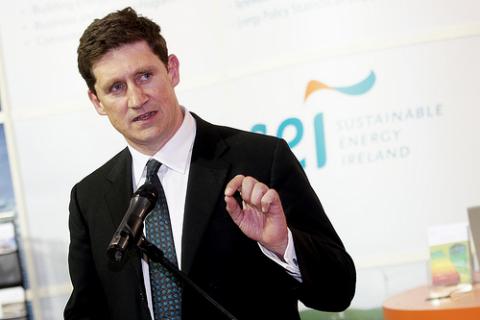Green around the gills as banks devour our society

The scariest thing in Ireland at present is the sound of Eamon Ryan waffling on RTE’s Morning Ireland, avoiding every question asked of him, with that trademark condescending verbal smirk, pretending he and his Green colleagues have even a smidgin of understanding of what is going on.
It is reminiscent of one of Peter Sellers’ Pink Panther movie where Sellers, as Inspector Clouseau, sitting on a couch, assured his audience that ‘‘everything is perfectly under control’’, before promptly falling off the couch.
Questioned by the able Aoife Kavanagh first about the 5 per cent electricity price hike and whether this would affect jobs, Ryan waffled and waffled. More waffle over whether the government could require the banks not to increase mortgage interest rates.
Asked whether it was Green Party policy, as stated by Dan Boyle last Monday, to wind down Anglo Irish Bank quickly, more waffle. Then the claim that the gigantic sums being poured into the banks was ‘‘manageable’’. On whether there were any regrets over the bailout of Anglo Irish two years ago, Ryan said he had read Patrick Honohan’s report on the banking crisis and Honohan had answered all.
But Honohan didn’t answer all. A defect of that excellent report was his failure to grapple with the option of guaranteeing just AIB and Bank of Ireland and letting the rest take their chances. Honohan does make the point that, had Anglo gone under then, it could have brought down the other banks - but that would have been in the absence of a guarantee for the other banks.
Nor did Honohan deal with the option of letting the banks go into administration, as Quinn Direct has done. Quinn Direct has continued to function, there is no bailout and no cost to the state. The absence of a resolution regime for banks was a big problem here.
But it is this ‘‘manageable’’ prattle that is the most worrying.
This banking crisis might end up costing this society €40 billion. This would indeed be manageable if society as a whole took responsibility. We have a GNP of around €130 billion and could handle a €40 billion loss if we did it as a society, a society that remains very rich. But we are only nominally a society.
There is this thing, ‘‘the state’’, which most people think is something different from society, rather than it being society’s agency for collective action, including distributing society’s wealth fairly. But such agency by society is ridiculed as evidence of the ‘‘nanny state’’, an easy dismissal of the idea of equality. It is because the prevailing ideology is dismissive of the very idea of society that we are indeed in trouble, and this huge debt is not at all manageable.
Two economists, Simon Johnson and Peter Boone, had a piece on the New York Times website last week, headlined ‘Irish worries for the global economy’. Johnson is Professor of Entrepreneurship at MIT in Boston and a former chief economist at the IMF. Boone is a research associate at the Center for Economic Performance at the London School of Economics.
They say of the massively costly bank bailout: ‘‘Despite - or perhaps because of - this therapy, financial markets are beginning to see Ireland as Europe’s next Greece. In the last few weeks, the perceived probability of default by Ireland (as traded in credit-default swap markets) has shot up, so that markets now price a 25 per cent risk that Ireland will default within five years.”
They add that, according to the Royal Bank of Scotland, ‘‘Irish banks have debt worth €26 billion, or one-fifth of Ireland’s national income, coming due in the month of September alone.
Ireland’s third-largest bank [Anglo] just announced it will likely need €25 billion in total capital injections from the government (19 per cent of gross national product, GNP),while Standard and Poor’s argue this figure is too low. In total, the debts of Irish banks could easily result in a charge to government debt equal to one-third of GNP. These debts need to be added to the fiscal deficit, which also remains dangerously out of control’’.
They calculate that, under current policies, each Irish family of four will be liable for €200,000 in public debt by 2015. There are only 73,000 children born in Ireland each year, and these children will be paying off debts for decades to come as well as having to accept much greater austerity than has already been implemented.
There is no doubt that social welfare systems, healthcare and education spending will decline sharply.
I had never previously heard of Johnson and Boone, and do not know what significance to attach to their views. But these guys have got a very high-profile platform in the New York Times, and what they are saying is more or less the same as the ratings agencies have said.
So, even if what these guys are saying is exaggerated, it is still a cause of bother for us, as the financial markets will pay attention.
But what they say seems entirely plausible, which means quite something. It is that we put the future of this country in hock with the bank guarantee of two years ago, the most extensive guarantee any country gave its banks.
We did so to ensure that the financial markets would be impressed and continue lending us money at reasonable rates.
Now, precisely because we gave such a guarantee, it transpires that the financial markets are not at all impressed, so will give us loans only at relatively exorbitant interest rates.
How could this spiral be manageable?
The two Green ministers slept in their beds the night the bank guarantee was cooked up. Some of us were critical of their somnolence. We were wrong and, for myself, I apologise.
Pity they don’t stay in their beds all the time.
